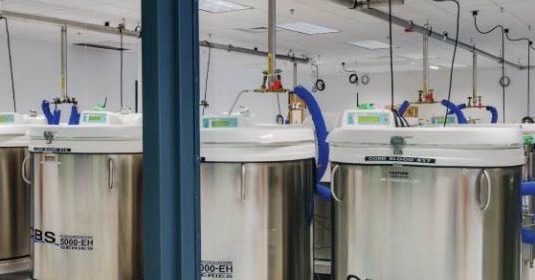
Freezing your eggs is intended to preserve your options for the future by using a very low temperature to stop all biological activity within the eggs and prevent the eggs from aging. In order to stay preserved, your eggs need to be kept frozen at a stable -196ºC in liquid nitrogen storage tanks—and a highly monitored, secure storage facility is imperative.
Learn more about egg cryopreservation.
Contact Us to Chat with a Fertility Advisor
Here’s how we do it:
Automatic temperature maintenance
The liquid nitrogen level in a cryogenic storage tank is what allows it to maintain its very cold temperature. Extend Fertility’s storage tanks use an automatic liquid nitrogen feed, meaning if the liquid nitrogen level drops (due to natural evaporation or any other reason), the automatic feed will remedy the level variation immediately. This system removes the chance of human error in the maintenance of the proper temperature for frozen eggs.
Constant monitoring
Extend Fertility’s cryogenic storage is monitored all day, every day via a sophisticated system of electronic and human supervision. Our cryogenic storage staff is on-site 365 days a year, and our storage tank room is visible to that staff at all times. Even though Extend’s tanks are kept at the correct levels automatically, our system electronically monitors the temperatures and nitrogen levels of the tanks every 15 minutes. If any temperature variations were to occur, our alarm system alerts personnel immediately. Additionally, our team visually inspects and double-checks nitrogen levels daily, as an extra layer of protection against temperature variation.
No susceptibility to power outages
Importantly, Extend Fertility does not count on electricity to feed the liquid nitrogen needed for cryogenic storage from its 9,000-gallon holding tank. Extend Fertility always has enough liquid nitrogen on-hand to last an extended period of time, and can receive new supplies of liquid nitrogen in less than 24 hours. That means a power failure, such as in the case of a natural disaster, isn’t going to impact the eggs. Still, Extend Fertility has a very large backup generator that can power our entire facility (including our alarm systems) in the case of an outage.
Extremely secure
Extend Fertility has video surveillance, an ADT alarm system, and motion detectors. All visitors must be identified and buzzed in. Eggs are stored in tanks in a designated egg freezing storage room with its own security, and access to that room is restricted to only necessary personnel.
Additionally, Extend Fertility has protocols to keep all human tissue samples (like eggs) organized and properly identified. Every patient has an identification number, and that, along with their name and date of birth, is included on every sample. Extend Fertility logs all samples physically (on paper) and electronically; our paper records are stored in fireproof safes and our computers have many backups. Additionally, two people always check whatever Extend Fertility is doing with any sample; nothing is ever handled solo. Extend Fertility never deviates from these protocols.
Highly regulated
Extend Fertility is registered and governed by the FDA, licensed with appropriate regulatory agencies, and is regularly inspected by several entities. Our equipment, protocols, and standards exceed all federal and state regulations.
Bottom line: Extend Fertility uses a highly tested, fail-safe inventory and storage system, which is why we have full trust in the safety and security of all frozen eggs stored here.
The safety of our patients’ eggs is a top priority. If you have any concerns or questions, please don’t hesitate to contact us.




